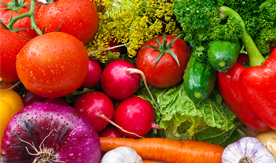
Fresh and Safe
The University of Maine has been awarded two food safety competitive grants from the U.S. Department of Agriculture (USDA), including a $4.9 million, five-year award to improve processing technologies to enhance the safety and quality of fresh produce and low-moisture foods, such as raw grains, spices, seeds and nuts. The awarded projects are led by Vivian Wu, professor of microbiology and food safety in the School of Food and Agriculture.
UMaine was one of 36 universities nationwide to receive a total of $19 million in awards from the USDA’s National Institute of Food and Agriculture (NIFA), including more than $6.7 million for antimicrobial resistance strategies. The grants focus on research to ensure a safe, nutritious food supply and maintain American agricultural competitiveness, according to the announcement by the USDA.
Wu receives a two-year, $150,000 grant to improve food safety through use of magnetic resonance imaging (MRI) to examine the invasion and localization of pathogens in plants. MRI technology, the same used in medical radiology to visualize internal structures in detail, has the potential to provide more accurate information when compared to the traditional microbiological methods.
This new project is expected to develop a novel, noninvasive method using MRI to better determine and understand the internalization of pathogens — first, in produce, and eventually in live animals. The MRI detection system could inform pre-harvest interventions to reduce internalized contamination, meeting USDA/NIFA’s goal to reduce food-borne illness and deaths through a safer food supply.
This year, Wu receives the first year funding, $900,000, as first position of the $4.9 million, five-year research project she leads, focused on enhancing the safety and quality of fresh produce and low-moisture foods by waterless, nonthermal technologies. The focus is on the effectiveness and mechanisms of inactivating bacterial, viral and parasitic pathogens using light and gaseous treatments.
In recent decades, there has been a significant increase in the consumption of produce and low-moisture foods, such as nuts, cereals and spices, which are susceptible to contamination by pathogens, from pre- to post-harvest. The challenge for food scientists is to develop new technologies that will improve the safety and extend the shelf life of food products without compromising safety or sensory properties.
Unless they are fresh fruits and vegetables consumed raw, most foods are thermally preserved or cooked at high temperatures. Nonthermal treatments allow for the processing of foods below the temperatures used during pasteurization and canning, causing minimal changes in flavor and quality while removing pathogens.
This project will investigate the emerging nonthermal technologies, such as decontaminating lights, gaseous treatment and cold plasma (ionized atmospheric air) — processes used on an industrial scale for manufacturing of electronics and medical instruments. Wu’s team will use combinations of technologies to optimize product quality and inactivate pathogens, with a goal of commercializing the process.
With the technology transfer to industry, it is expected that processors will spend less money on energy inputs — energy for heat, water and chemicals — passing the savings on the consumer.
With the increasing outbreaks associated with fresh produce and low-moisture foods, the ability to provide effective microbiological control will be critical to maintaining consumer confidence in the agricultural and food industries, both in the United States and with international trading partners.
This five-year project led by Wu is built on the collaborative efforts of UMaine, USDA ARS Eastern Regional Research Center, University of Delaware, Ohio State University and Virginia Tech.
Margaret Nagle, 207.581.3745
